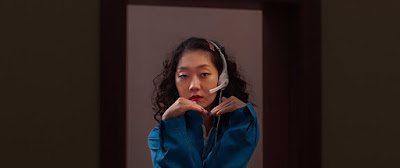Some debut films safely follow traditions set before them, and serve as nothing more than calling cards for making the next big budget Hollywood blockbuster movie. The Korean film Maggie (2018) from Yi Ok-seop, definitely does not fall into that category. Instead, Maggie is an utterly unique and delightfully strange film that seems to exist in a parallel dimension; one that we would all like to visit and enjoy as a respite from the mundane world of studio filmmaking.
The less revealed about the plot the better, as part of the thrill of viewing Maggie is discovering the many new ways Yi Ok-seop plays with traditional narrative structure and the film form. In fact, to even attempt to provide a traditional plot summary of Maggie would ruin the many surprises inherent within the film. However, for the sake of clarity, Maggie is about the wondrous and eccentric chain of events that occur to a young nurse (Yoon-Young, played by Lee Joo-Young), her boss (Lee Kyung-Jin, played by Moon So-Ri), and her boyfriend (Sung-Won, played by Koo Gyo-Hwan) after a compromising X-ray photo of a couple having sex surfaces at the hospital the nurse works at.
What makes Maggie such an original vision is its complete absurdist disregard for the traditional three act structure of narrative filmmaking. Instead, Maggie freely floats in an almost stream of consciousness manner between the parallel and interconnecting lives of its three main characters. What unites the three characters together are a psychic fish named Maggie and her ability to form sinkholes throughout South Korea. Yi Ok-seop masterfully weaves these various storylines together to create a surreal tapestry of young love (through the relationship of Nurse Yoon-Young and Sung-Won) and unresolved regret (through the story of Lee Kyung-Jin), all observed omnisciently by the all-knowing fish Maggie.
What is the significance of this fish? Maggie the fish serves both as the narrator of the film, and also as a sort of God-like figure that is constantly guiding the lives of the three main characters. Employing the use of constantly changing interior monologues and perspectives in both human and sometimes non-human form, as well as camera angles and mise-en-scene that are slightly askew from the norm, Yi Ok-seop creates a free flowing use of cinematic techniques that truly liberates the medium. In one of the most amazing sequences in Maggie, Yi Ok-seop daringly cuts back and forth between Yoon-Young and Sung-Won as they breathlessly try to meet each other to secure a rental agreement, culminating in a shot on top of a flight of stairs that leaves the viewer in genuine shock. In another inventive sequence, Lee Kyung-Jin and Yoon-Young try to determine the veracity of their co-workers at the hospital with a game of darts using syringes.
Throughout the film, Yi Ok-seop symbolically explores the concept of falling into pits, both literally through the sinkholes that are seemingly controlled by Maggie the fish, and the subconscious holes that the characters find themselves falling into. Nurse Yoon-Young becomes obsessed with finding out if her boyfriend is capable of violence after she learns from his ex that he may have hit her at one time. Lee Kyung-Jin can’t escape the memory of a traumatic childhood event that still affects her adult life on a personal and professional level. Sung-Won starts to suspect his co-workers of theft and deception after he loses a ring that Yoon-Young gave him. Maggie explores how each of these characters struggle to dig themselves out of the subconscious pits they have fallen into, leading to a surprising climax that neatly ties together Yi Ok-seop absurdist vision.
In an era where so many filmmakers start their careers off with routine, mundane films whose sole purpose is to impress the gatekeepers of the traditional Hollywood studio film machine, it’s refreshing to see a debut film like Maggie which unapologetically adheres to its own unique worldview. Although Yi Ok-seop is influenced by masters of surrealism like Dali, Bunuel, and Maya Dern, at the same time she has created a personal vision that heralds the arrival of a new voice in cinema. We need more debut films like Maggie to move the language of film forward, and remind us of the many joyful possibilities within the medium that still are waiting to be discovered.






No comments:
Post a Comment